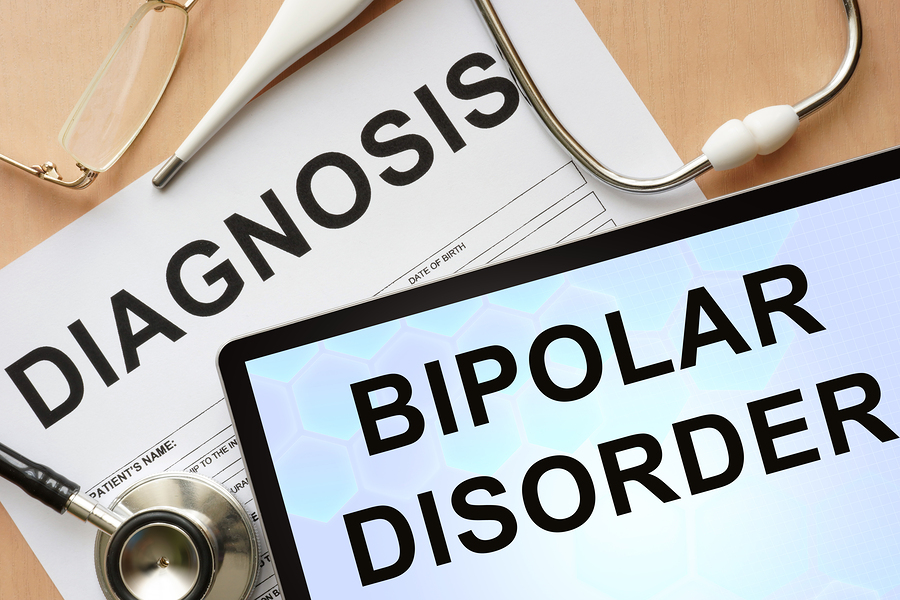- Make It Yourself Lavender Heart-Shaped Bath Bombs!
- 20 Things You Never Knew About “Down There”
- 12 Best Foods For Those Suffering From Arthritis Pain
- 12 Personal Hygiene Mistakes Almost Everyone Makes (Mom Never Told You About #4!)
- 15 Medicinal Plants And Herbs From The Cherokee People
- 12 Mind-Blowing Benefits Of Drinking Coconut Water During Pregnancy
- 12 Outstanding Winter Foods That Won’t Fatten You Up Like A Christmas Turkey
15 Warning Signs You Or Someone You Love Is Bipolar

Photo credit: bigstock.com
Manic depression, or bipolar disorder, is a mental disorder that affects at least 6 million Americans every year. This disease forces those afflicted to live in a world of constantly shifting emotions and ideas that they have no control over. This also affects friends and family members as well.
Most people begin to notice symptoms during their late teens, and by their mid-twenties, the disease in full effect. Although this disease can show itself during early childhood or in middle-aged adults, it typically starts in the late teens. It is the sixth most common disability in the world.
Although the exact reason behind why this disease develops is not yet fully understood, it is believed to develop by those suffering from depression or through heredity.
Although most people believe that depression and bipolar disorder is the same thing, this isn’t true. Those suffering from depression tend to have long, drawn out symptoms with no feelings of elation. Those who are bipolar have sudden burst of intense emotions such as feelings of elation, anger, or uncontrolled excitability.
Bipolar disorder is so named due to the periods of mania that those with depression do not experience. Manic episodes can last for as long as two weeks, but for most people they are four to seven days in length. Those with depression generally feel down for weeks at a time.
It can be difficult for those who do not suffer from either disorder to know the difference between people who are depressed and those who are bipolar. Many people with severe bipolar disorder need medication to have more normal lives. If you have any doubts, please see a doctor or a psychiatrist for a proper evaluation. Those who are severely affected can be a danger to themselves or others, so please, seek medical advice.
Keep reading for the 15 signs or symptoms of bipolar disorder to determine if you or someone you love is affected.
1. Sleep Issues
Both depression and bipolar disorder affect the sleep patterns of most people. However, those who are bipolar will have very obvious shifts in their sleep patterns. During their manic phase, they only sleep a few hours, but they don’t feel tired and appear to have tons of energy. During their depressive state, they might sleep most of the day and night. Those with depression usually can’t sleep at night but feel sleepy during the day.
Continue to Page 2

Photo credit: bigstock.com
2. Intense Mood Swings
This is a mixed symptom that leaves many dealing with the bipolar individual feeling confused. The bipolar individual can go from a highly positive, high energy mood to a negative, depressed, or angry outlook in a matter of minutes. They can also go the other way — changing from a depressed state of mind to a very positive outlook at a moment’s notice.
3. Erratic Behavior
During the manic or ‘up’ phase, those with bipolar disorder can display an inflated sense of self-esteem. They feel important, special, and don’t appear to understand consequences. If it sounds good to them, they feel like they can do it, and they generally do. Typical behaviors are spending sprees, wild sexual behavior, taking ‘vacations,’ or leaving town with someone they just met without notifying anyone or taking any clothes or money with them.
4. High Energy Combined With Low Mood
Sometimes, the mania a person is feeling crashes into their depression, confusing both mind and body with mixed signals. This means that a bipolar person can feel depressed but still have racing, uncontrolled thoughts, feelings of anxiety, an inability to sleep, an inability to focus, and feelings of restlessness. This is one of the most dangerous times for those with bipolar disorder, as they have energy and feel the need to ‘do something,’ but they are also intensely depressed. This can lead to suicidal thoughts. If you find yourself feeling this way or notice a loved one talking about suicide, please call 911 immediately for help.
5. Alcohol And/or Drug Abuse
An estimated 50 percent of those diagnosed with bipolar disorder have a problem with either drugs or alcohol, and sometimes both. Many people will drink excessively during the manic phase in an attempt to calm themselves, while others drink to improve their mood when they are depressed. The same is true of drugs abuse — it is an attempt to control their wild mood swings.
6. Easily Irritated
Those with bipolar disorder can have intense highs, but they are also easily irritated and irritable. They often find that, even during their manic phase, the smallest things cause them to overact. Those who are bipolar feel impatient with everyone and everything, which usually results in angry outbursts over trivial matters.
7. Easily Distracted
During the manic phase, there is often a type of hyperactive attention span that shifts frequently. Those who are bipolar tend to be unable to focus on anything for more than a few minutes and are easily distracted by the smallest things, such as a noise or even a bright light.
8. Delusional
During their manic phase, bipolar people can become completely delusional about their abilities. They might believe that they can paint as well as Picasso, sing like Frank Sinatra, or dance like Fred Astaire. Other delusions might be that they can fly a plane, drive a car (even if they have never done so before), and operate machinery they have never seen before, or forgive sins. These delusional feelings of over-confidence fall completely flat once their depressive mode kicks in.
Continue to Page 3

Photo credit: bigstock.com
9. Inability To Complete Tasks
One of the hallmarks of bipolar disorder is a house full of partially completed projects or tasks. Although some people with bipolar disorder seem to be able to harness all the energy they have during their manic phase and are incredibly productive (such as staying up all night to decorate the house for Christmas), the majority of them go from task to task, making huge plans or organizing unrealistic projects that are often started but never completed.
10. Listlessness
On the opposite end of their emotional scale, when the bipolar person falls into depression, it is just as low as their high can be. They have no energy, sometimes refusing to get out of bed, saying that they are too tired; they might slur their speech, not appear to be able to make even the simplest decision; and they can even appear to be drugged. These are all common symptoms of a depression episode.
11. Bad Or Careless Decision Making
During the manic phase, there can be signs of impulsive tendencies where the person makes sudden or rush decisions with no apparent awareness or concern about the consequences. A lack of care about the possibility of their decisions or poor judgment can lead to abusive activities.
12. Weight Fluctuation
During their depressive phase, there is usually a lack of appetite. Sometimes, the bipolar person suddenly decides they need to eat, a lot, which can lead to weight gain. These opposing diets can lead to sudden weight loss or weight gain, with many people going through periods of both.
13. Jumbled Or Racing Thoughts
During the manic phase, there is an awful lot of activity going on in the brain of a bipolar person. They often have numerous racing thoughts and ideas that they cannot keep up with, and they sometimes believe that these thoughts are messages from other people, spirits, or that the radio or television is speaking directly to them. This continual airport of thoughts makes it almost impossible for the bipolar person to collect a reasonable perception of the world around them.
14. Rapid Speech
As you might imagine, with all those thoughts bouncing around in their heads, bipolar people try to keep up with it by going off on high speed rants, trying to fit everything they are thinking into words, which is impossible. This sometimes causes feelings of intense stress and anger when people ask them to slow down. This isn’t the same as a “Chatty Cathy.” Some people do like to talk, but this is much more than that. If you try to speak to a bipolar person who is going through this, they will simply speak louder than you, even shout, because they feel the need to get these words and thoughts out of their heads.
15. Recurring Thoughts Of Death Or Suicide
During their depressive phase, many bipolar people find that they have recurring thoughts of suicide or death. They might make plans for committing suicide or even attempt suicide. This often comes from intense feelings of worthlessness, excessive levels of guilt, or even thoughts that are simply not true, but the person believes them to be true.
Unfortunately, many people with this disease never get the treatment they need. They believe that their extreme moods are completely normal and don’t understand why their behavior upsets everyone else. Some people enjoy their manic phases but the crash or depression stage often leaves them feeling worn out and suicidal.
READ ALSO: 15 Natural Herbs for Those with Bipolar Disorder
If you have symptoms of depression or mania, please see your doctor for a proper diagnosis. If you recognize these symptoms in a family member or friend, it can be difficult to get them to see a doctor because they truly do not believe that there is anything wrong with them. Sometimes it works best if you tell them that you simply want their company while YOU see the doctor.
Bipolar disorder does not go away or get better without some type of treatment. If it is mild, you might try natural calming herbs or essential oils, but severe cases will require treatment. Speak with your doctor to determine what is best for you or the person you care about.
References:
































